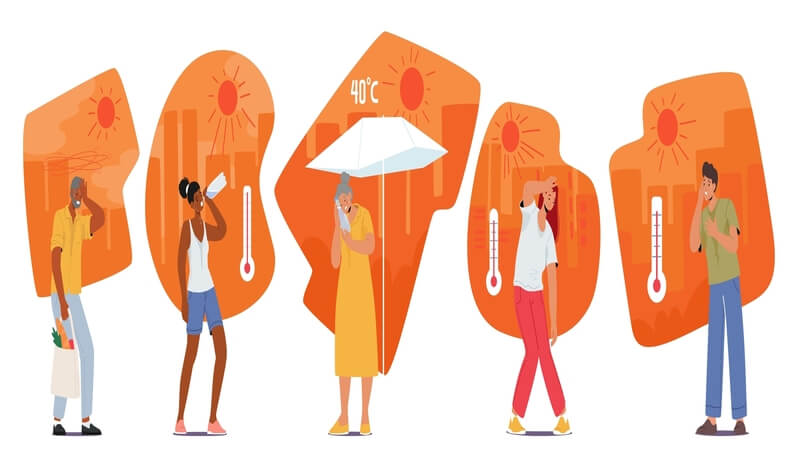Introduction
As summer temperatures soar, many of us feel more stressed and irritable. Hot weather doesn’t just impact our comfort level; it can also trigger an increase in stress hormones. Understanding how heat affects our bodies and learning effective ways to manage this stress can help us stay cool and calm during the hottest months of the year.
How Hot Weather Affects Stress Hormones
Physiological Stress Response
When exposed to high temperatures, our bodies initiate a stress response to cope with the heat. This response includes the release of several key stress hormones:
- Cortisol: High temperatures can cause an increase in cortisol, the primary stress hormone. Cortisol helps the body manage stress by regulating various physiological processes. However, prolonged elevated cortisol levels can lead to negative health effects such as weakened immune function and increased blood pressure.
- Adrenaline and Noradrenaline: The body also releases adrenaline and noradrenaline in response to heat stress. These hormones prepare the body to deal with the perceived threat of overheating by increasing heart rate and blood flow to muscles.
Dehydration and Heat Stress
Hot weather can lead to dehydration, which puts additional stress on the body:
- Dehydration: When we sweat more in the heat, our bodies lose essential fluids. This dehydration can trigger the release of more cortisol as the body tries to manage the stress of insufficient fluids.
- Heat Stress: Prolonged exposure to high temperatures can lead to heat stress, further elevating stress hormone levels. As the body struggles to cool down through sweating, the stress response is exacerbated, leading to increased levels of cortisol and adrenaline.
Sleep Disruption
High temperatures, especially at night, can disrupt sleep patterns, which contributes to increased stress:
- Poor Sleep: Hot, uncomfortable nights can lead to poor sleep quality and quantity. Inadequate rest is a known stressor and can increase cortisol levels, making it harder for the body to recover and manage stress effectively.
Behavioral Changes
Hot weather can affect our mood and behavior, further increasing stress:
- Irritability and Mood Swings: High temperatures can make us more irritable and prone to mood swings, creating a cycle of stress that elevates stress hormone levels.
- Reduced Physical Activity: People often avoid physical activity in extreme heat, which can impact mental health and stress management. Regular physical activity helps reduce stress hormones and improve mood, so inactivity can lead to higher stress levels.
Managing Stress in Hot Weather
Fortunately, there are several effective strategies to manage heat-induced stress and keep stress hormones in check:
Stay Hydrated
- Drink Plenty of Water: Ensure you drink enough water throughout the day to avoid dehydration. Carry a water bottle with you and take regular sips, especially if you are sweating a lot.
Cool Environment
- Air Conditioning and Fans: Spend time in air-conditioned spaces or use fans to help regulate your body temperature. Seek shade when outdoors and avoid direct sun exposure during peak heat hours.
Light Clothing
- Wear Breathable Fabrics: Choose light, breathable clothing made from natural fibers like cotton to help your body stay cool.
Adjust Schedules
- Plan Activities Wisely: Schedule physical activities for cooler parts of the day, such as early morning or late evening, to avoid the peak heat.
Relaxation Techniques
- Practice Relaxation: Engage in relaxation techniques such as deep breathing, meditation, or yoga to help manage stress levels. These practices can help reduce cortisol and promote a sense of calm.
Stay Indoors During Peak Heat
- Limit Outdoor Activities: Try to stay indoors during the hottest parts of the day, usually between 10 AM and 4 PM, to avoid excessive heat exposure.
Use Cooling Products
- Cooling Towels and Misters: Use cooling towels, misters, or ice packs to help lower your body temperature when you are feeling overheated.
Conclusion
Hot summer weather can significantly increase stress hormones, making us feel more anxious and irritable. By understanding how heat affects our bodies and implementing strategies to stay cool and hydrated, we can effectively manage heat-induced stress. With these tips, you can enjoy the summer months while keeping your stress levels in check and maintaining your overall well-bein

